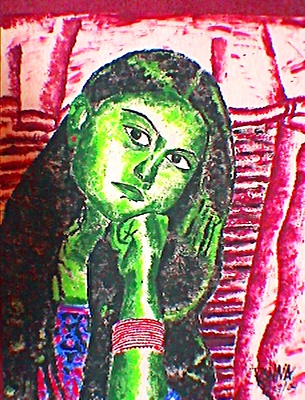All Nonfiction
- Bullying
- Books
- Academic
- Author Interviews
- Celebrity interviews
- College Articles
- College Essays
- Educator of the Year
- Heroes
- Interviews
- Memoir
- Personal Experience
- Sports
- Travel & Culture
All Opinions
- Bullying
- Current Events / Politics
- Discrimination
- Drugs / Alcohol / Smoking
- Entertainment / Celebrities
- Environment
- Love / Relationships
- Movies / Music / TV
- Pop Culture / Trends
- School / College
- Social Issues / Civics
- Spirituality / Religion
- Sports / Hobbies
All Hot Topics
- Bullying
- Community Service
- Environment
- Health
- Letters to the Editor
- Pride & Prejudice
- What Matters
- Back
Summer Guide
- Program Links
- Program Reviews
- Back
College Guide
- College Links
- College Reviews
- College Essays
- College Articles
- Back
Cultural Connections
Before going to Japan, I thought I already knew a fairly decent amount about the country and its language. I'd taken Japanese at school for two and a half years, so had a simple grasp of the Japanese language, and in class, I'd been exposed to several cultural aspects of Japan, including its music and pop culture. I could read simple children's stories in Japanese, recognize Japanese popular songs, and name some of the most important people in Japan.
I envisioned that going to Japan would allow me to see Japan close-up, but I didn't expect that, armed with the knowledge I already had about Japan, my homestay experience would be very surprising. I expected to see things in Japan that I was already familiar with, even if I'd only read about them in books. What I didn't realize at the time was that saying you know about Japan after studying it while in America is like saying you know how to swim after you've read about in a book.
After just three weeks in Japan, I'd seen castles, towers, and buildings I didn't even know existed beforehand. I'd gone to a Japanese school for a week, I'd participated in bukatsu (Japanese school clubs- they're much more involved than their American counterparts!) with my host sister, and I'd eaten more strange and unidentifiable foods than I knew existed (all very tasty, though). I came to realize throughout the course of my homestay that true Japan is not something that you can learn about from a book. All the little things that make Japan different from America- from the "women-only" subway cars to the vending machines selling warm drinks to the toilets with about 30 different buttons on them (I was too scared to press any of them)- have to be experienced personally.
Not only did I gain firsthand experience with Japanese culture while in Japan, my Japanese improved immensely. I remember that on the first night of the program, while staying in a Tokyo Hotel with other American students, I accidentally bumped into a Japanese lady in the hotel elevator, and I was too scared to even mumble "sumimasen" ("excuse me") to her. When I met my host family, the Hagihas, at the Osaka airport, I could only say a few words before it seemed that I'd exhausted all the Japanese I knew. But everyone I encountered was eager to help me improve my Japanese, and gradually, I became less timid about using the Japanese I already knew. One of my favorite memories from my three weeks is of me walking my host family's dog, Earu, with my host sister, Mizuki, and pointing to things like vending machines and subway stations, asking how to say them in Japanese. I probably learned about 100 words in this way over the course of my exchange. By the time I returned to Tokyo for my plane ride back to the United States, I was chatting away with my prgram volunteers in Japanese, and it felt almost as comfortable to use Japanese as it did English.
Perhaps the most surprising thing I noticed while in Japan was how much someone's world view is affected by the country and culture in which they grow up. I'd never realized before my experience that I see the world in such an American way. For me, it's normal and pretty expected for both parents in a family to work outside the home, but in Japan, it's still uncommon for women to have full-time professional jobs. In Japan, everything is recycled or reused until it has to be recycled, while in America, most families recycle only half of the things they could. One night, while my host sister was working on an essay for school about World War II, my host family started to ask me about American viewpoints of the war. They were shocked to hear that Americans don't study it very much in school and even more shocked to learn that I didn't know the name of the plane that dropped the atomic bomb over Hiroshima (they informed me that it was the Enola Gay). Similarly, it was amusing to watch a dubbed version of Night at the Museum II with them, because many of the cultural references, like the Smithsonian Museum, the Civil War, and Theodore Roosevelt, weren't familiar to them. Many of the movie's jokes must have been completely changed to adapt to Japanese audiences, because I remember hearing Mizuki tell my other host sister, Nana, "Americans wouldn't understand that joke."
I came back to America with a worldliness I didn't have before. I'd seen sights, eaten foods, and and done things no one I knew had done before. I realized that there's still so much about the world that I don't know, and my appetite was whet for more travel. I look forward to more cultural adventures in the future!

Similar Articles
JOIN THE DISCUSSION
This article has 2 comments.
